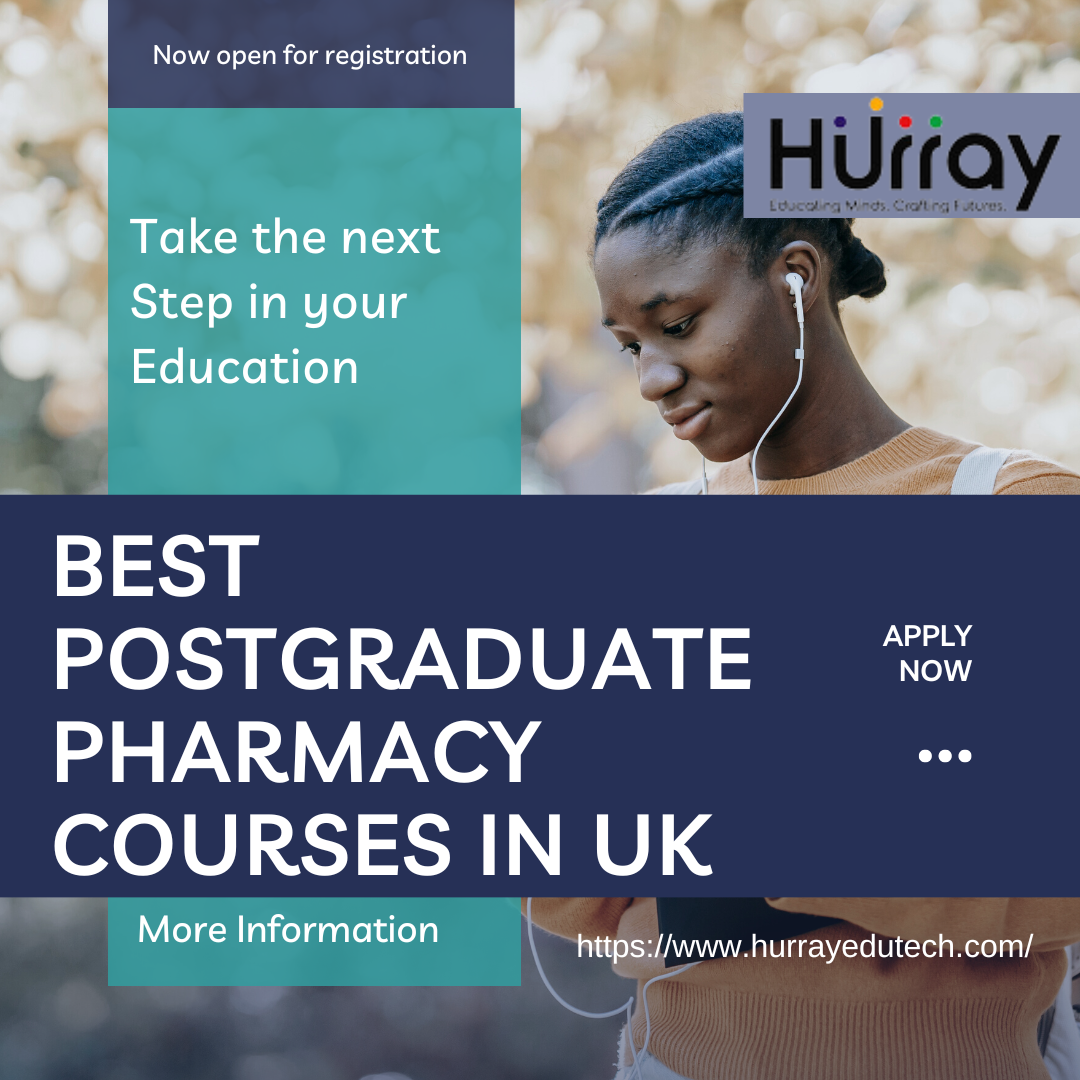Following your B Pharmacy degree in India, consider going to the UK for your further studies. Read on to learn about the best postgraduate pharmacy courses in the UK.
Master’s degrees in Pharmacy
Your best option to study further in the UK is by choosing a Master’s degree.
UK universities offer a number of MSc programs related to pharmaceutical sciences. Each university offers unique opportunities to specialize in one area or in a combination of 2 related fields. This ensures that you can go beyond the fundamentals you studied in your Bachelor’s, and develop real expertise in an in-demand area cue card questions .
Besides MSc degrees, some universities offer the option to pursue an MRes, which is entirely research-based, or to opt for one of multiple exit points with PGDip and PGCert options.
These programs are typically for 1 year, and can cost anywhere between 15,000 to 30,000 GBP – depending on the university standing as well as the type of program.
Specializations Available
-
Pharmacology/Pharmaceutical Science
These programs will help you develop a deeper understanding of pharmacology, including the mechanisms by which drugs act. You’ll study modules like Systems and Cellular Pharmacology and Pharmacology of Biological Systems.
-
Clinical Pharmacology
Here, you’ll learn how to apply clinical pharmacological, regulatory and ethical principles to the optimisation of therapeutic practice and clinical research. You’ll be exposed to emerging areas such as pharmacogenomics and personalized medicine. Modules you’ll study include Principles of Pharmacology, Drug Disposition, Topics in Therapeutics etc.(oet)
-
Drug Discovery/Development
These programs are designed to equip you with skills highly demanded within the industry. Along with modules in pharmacology principles, your program will include learning how to translate lab-based research into commercially-ready medical biotechnology and drugs, covering various aspects of the development process, from initial design to clinical trials. You’ll be exposed to emerging areas like Translational Medicine as well.
-
Toxicology
These programs aim to provide you with a comprehensive overview of drug safety practices within the drug development process. You’ll cover topics like Safety Pharmacology, Mechanisms of Drug-induced Toxicities and Regulatory affairs, alongside other pharmacology subjects.
-
Biotechnology
Here, alongside fundamental pharmacology subjects, you’ll specialize in Biotechnological Approaches to Pharmacology, ranging from the synthesis of new drugs, to the production of drugs from genetically modified microorganisms.
-
Neuroscience/Neuropharmacology
In this specialization, the emphasis is on the interaction between drugs and the nervous system. You can expect to study modules like Cognitive Neuroscience and Neurophysiology in these courses.
Study Options
-
MSc Pharmacology, King’s College London
-
MRes Pharmacology, Nottingham Trent University
-
MSc Clinical Pharmacology, University of Glasgow
-
MSc Clinical Pharmacology, University of Aberdeen
-
MSc Clinical Pharmacology, King’s College London
-
MSc Pharmacology and Drug Discovery, Coventry University
-
MSc Pharmacology and Drug Development, University of York
-
MSc Drug Discovery and Toxicology, University of Hertfordshire
-
MSc Drug Toxicology and Safety, University of Bradford
-
MSc/MRes Pharmacology and Biotechnology, Sheffield Hallam University
-
MRes Pharmaceutical Technology, University of Bradford
-
MSc Physiology, Pharmacology and Neuroscience, University of Bristol
-
MSc Neuropharmacology, Nottingham Trent University
-
MSc/PGDip/PGCert Analytical and Pharmaceutical Science, Loughborough University
-
MSc/PGDip/PGCert Pharmaceutical Science and Medical Chemistry, Loughborough University
Entry Requirements
|
Academic Qualifications |
Bachelor’s degree in relevant discipline, including pharmaceutical science, medical science, biological sciences, life sciences etc. Min. score equivalent to UK 2:1 or 2:2 will be required, depending on the university. (Equivalent to 55 to 65% in 3-year Bachelor’s from Indian universities) |
|
Professional Experience |
Not required, but can provide added value to your application. |
|
Other Requirements |
Personal statement may be required. MRes may require statement of research interests. |
|
English Language Requirements |
IELTS Academic with min. 6.5. |
|
Scholarships and Funding |
Scholarships are available. |
How You’ll Study
Course Structure
Your course of study will include modules related to pharmacology and cellular/molecular sciences more generally, as well as modules related to the specialization of your chosen program, as you saw above.
The emphasis in most modules is on practical lab-based learning, in addition to theory. You’ll clock a number of hours in the lab.
UK MSc programs lay strong emphasis on research. You’ll have to complete a research project or write a dissertation on a relevant topic. You’ll work under the guidance of an experienced professional, and will be trained in specialist laboratory techniques as well as bioethical considerations of clinical research in the area.
Other Learning Opportunities & Career Support
Several of these programs offer work-integrated learning opportunities in the form of placements or internships – you’ll get to work in the field, putting learning into practice and gaining real-world experience. UK universities have close ties with industry leaders, helping you to gain exposure to cutting-edge developments, as well as make good connections.
To further your career, your university will also offer opportunities to gain additional employable skills, build networks and meet recruiters 10 common collocations .
Learning Outcomes & Career Track
Properly trained professionals in pharmaceutical sciences and related fields are in very high demand in the UK, and globally. Over one year of study, you’ll develop all the skills you need to secure those jobs, from research to clinical to ethical and regulatory skills.
Your career prospects are excellent with this degree – you’ll be able to enter academic research, pharmaceutical, biotechnological and related industries, or public organizations in the drug, food, health and environmental sectors
Graduates of these programs have secured roles as:
-
Clinical Research Manager
-
Research Scientist
-
Clinical Scientist
-
Clinical Data Managers
-
Pharmacologist
-
Lab Technician
-
Drug Safety, Quality, Regulation & Compliance Officers
-
Consumer Safety Managers
-
Patent Attorney
-
Regulatory Affairs Associate
-
Sales Representative
-
Medical Writer
Did you find this information on Postgraduate Pharmacy courses in the UK useful? To know more about it, reach out to us at info@hurrayedutech.com or call us at 9900426501.
Hurray offers Study Abroad consultation, IELTS/PTE/OET and Spoken English programs. Visit our website https://www.hurrayedutech.com/ for more information.
Email Id: info@hurrayedutech.com
Mobile Number: 9900621169
(for Overseas education) For training IELTS PTE OET Grammer 9900426501











Post Comments